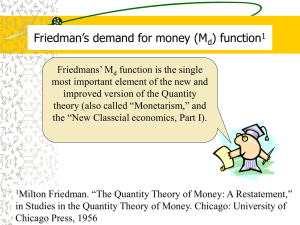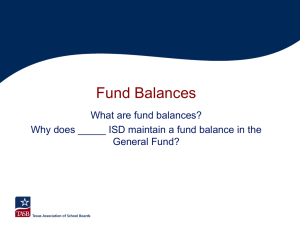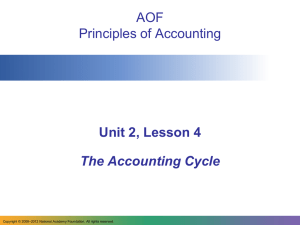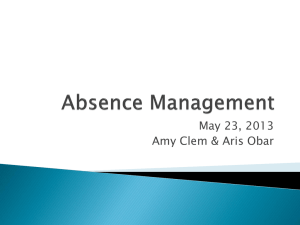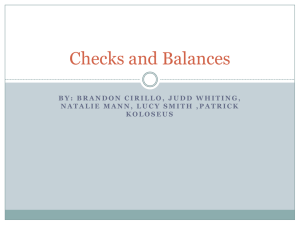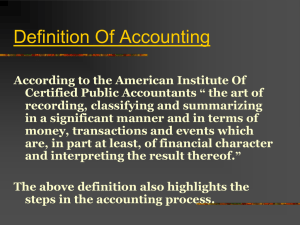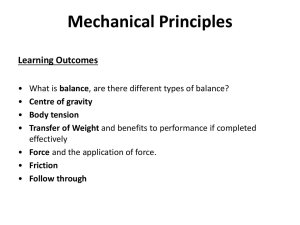PSLiquidationHOdemo
advertisement
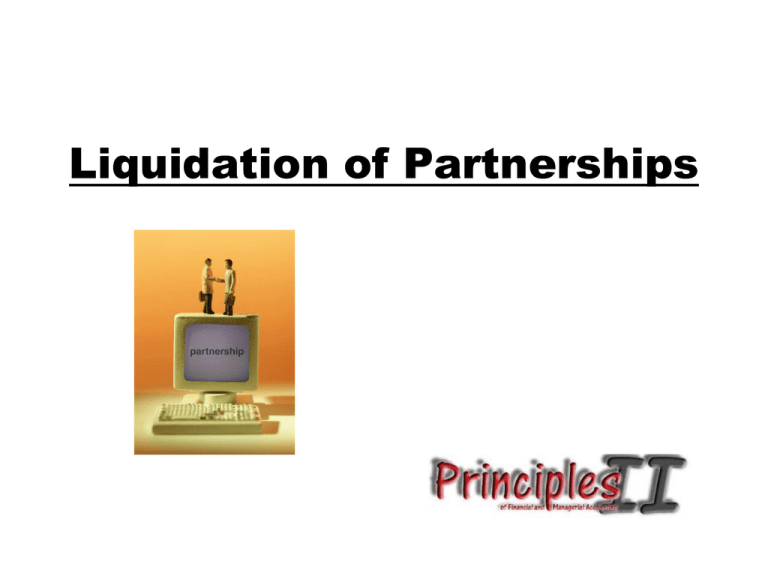
Liquidation of Partnerships Table of Contents I. II. III. IV. V. VI. The The The The The The Case Problem Handout Solution for Part (a) Journal Entries for Part (a) Solution for Part (b) Journal Entries for Part (b) This presentation is a work in progress. Most of these Table of Content items have been completed; others may be completed in the future. Hopefully, you will be able to go to the portion you did not get to complete in class or the portion you would like to review. Happy clicking! The Case Printer Friendly Version Oh, Are, and Ewe are partners who share profits and losses 2:1:2. A summary of the balances in the accounts in their general ledger at the time they decide to liquidate their partnership is as follows: Cash Non-Cash Assets 8,100 70,600 Liabilities 27,500 Oh, Capital 23,300 Are, Capital 12,100 Ewe, Capital 15,800 Totals 78,700 78,700 Instructions: Make the entries necessary to liquidate their partnership (1) in terms of the accounting equation, and (2) as general journal entries assuming the noncash assets are sold for (a) $70,600, and (b) $20,600, and the deficient partner subsequently pays $2,700 of his deficiency. Return to TOC The Handout • Two pages follow: – One for part (a) – Another for part (b) Return to TOC Name ________________________________ Principles of Financial and Managerial Accounting II Liquidation of Partnerships (a) ASSETS Description beg bal Cash 8,100 = Printer Friendly Version LIABILITIES + OWNERS’ EQUITY Non-Cash Liabilitie s 70,600 27,500 Oh (2) 23,300 Are (1) 12,100 Ewe (2) 15,800 a balances b balances c balances Return to TOC Principles of Financial and Managerial Accounting II Liquidation of Partnerships (b) ASSETS Description beg bal Cash 8,100 = Non-Cash 70,600 Printer Friendly Version LIABILITIES + OWNERS’ EQUITY Liabilitie s 27,500 Oh (2) 23,300 Are (1) 12,100 Ewe (2) 15,800 a balances b balances c balances d balances e balances Return to TOC The Solution: Part (a) Return to TOC a) Assuming the non-cash assets were sold for $70,600. ASSETS Description beg bal Cash 8,100 = Non-Cash 70,600 LIABILITIES + OWNERS’ EQUITY Liabilities 27,500 Oh (2) Are (1) Ewe (2) 23,300 12,100 15,800 23,300 -12,100 -15,800 a realization balances b balances c balances a) Assuming the non-cash assets were sold for $70,600. ASSETS Description beg bal a realization Cash 8,100 = Non-Cash 70,600 LIABILITIES + OWNERS’ EQUITY Liabilities 27,500 Oh (2) Are (1) Ewe (2) 23,300 12,100 15,800 23,300 -12,100 -15,800 +70,600 balances b balances c balances a) Assuming the non-cash assets were sold for $70,600. ASSETS Description beg bal a realization Cash = Non-Cash 8,100 70,600 +70,600 -70,600 LIABILITIES + OWNERS’ EQUITY Liabilities 27,500 Oh (2) Are (1) Ewe (2) 23,300 12,100 15,800 23,300 -12,100 -15,800 balances b balances c balances a) Assuming the non-cash assets were sold for $70,600. ASSETS Description beg bal a realization balances Cash = Non-Cash 8,100 70,600 +70,600 -70,600 78,700 0 LIABILITIES + OWNERS’ EQUITY Liabilities Oh (2) Are (1) Ewe (2) 27,500 23,300 12,100 15,800 27,500 23,300 12,100 15,800 23,300 -12,100 -15,800 b balances c balances Bring down ALL the new balances. a) Assuming the non-cash assets were sold for $70,600. ASSETS Description beg bal a realization balances Cash = Non-Cash 8,100 70,600 +70,600 -70,600 78,700 0 LIABILITIES + OWNERS’ EQUITY Liabilities Oh (2) Are (1) Ewe (2) 27,500 23,300 12,100 15,800 27,500 23,300 12,100 15,800 23,300 -12,100 -15,800 b balances c balances The steps in liquidation are (essentially) always the same. a) Assuming the non-cash assets were sold for $70,600. ASSETS Description beg bal a realization balances Cash = Non-Cash 8,100 70,600 +70,600 -70,600 78,700 0 LIABILITIES + OWNERS’ EQUITY Liabilities Oh (2) Are (1) Ewe (2) 27,500 23,300 12,100 15,800 27,500 23,300 12,100 15,800 23,300 -12,100 -15,800 b pay creditors balances c balances a) Assuming the non-cash assets were sold for $70,600. ASSETS Description beg bal a realization balances b pay creditors Cash = Non-Cash 8,100 70,600 +70,600 -70,600 78,700 -27,500 0 LIABILITIES + OWNERS’ EQUITY Liabilities Oh (2) Are (1) Ewe (2) 27,500 23,300 12,100 15,800 27,500 23,300 12,100 15,800 23,300 -12,100 -15,800 -27,500 balances c balances a) Assuming the non-cash assets were sold for $70,600. ASSETS Description beg bal a realization balances b pay creditors balances c Cash = Non-Cash 8,100 70,600 +70,600 -70,600 78,700 0 -27,500 51,200 LIABILITIES + OWNERS’ EQUITY Liabilities Oh (2) Are (1) Ewe (2) 27,500 23,300 12,100 15,800 27,500 23,300 12,100 15,800 23,300 12,100 15,800 23,300 -12,100 -15,800 -27,500 0 0 balances Bring down ALL the new balances. a) Assuming the non-cash assets were sold for $70,600. ASSETS Description beg bal a realization balances c Non-Cash 8,100 70,600 +70,600 -70,600 78,700 b pay creditors balances Cash = 0 -27,500 51,200 LIABILITIES + OWNERS’ EQUITY Liabilities Oh (2) Are (1) Ewe (2) 27,500 23,300 12,100 15,800 27,500 23,300 12,100 15,800 23,300 12,100 15,800 23,300 -12,100 -15,800 -27,500 0 0 balances The steps in liquidation are (essentially always the same. a) Assuming the non-cash assets were sold for $70,600. ASSETS Description beg bal a realization balances b pay creditors Cash Non-Cash 8,100 70,600 +70,600 -70,600 78,700 0 -27,500 balances 51,200 c pay partners -51,200 balances = LIABILITIES + OWNERS’ EQUITY Liabilities Oh (2) Are (1) Ewe (2) 27,500 23,300 12,100 15,800 27,500 23,300 12,100 15,800 23,300 12,100 15,800 -23,300 -12,100 -15,800 -27,500 0 0 a) Assuming the non-cash assets were sold for $70,600. ASSETS Description beg bal a realization balances b pay creditors Cash Non-Cash 8,100 70,600 +70,600 -70,600 78,700 0 -27,500 balances 51,200 c pay partners -51,200 balances = 0 LIABILITIES + OWNERS’ EQUITY Liabilities Oh (2) Are (1) Ewe (2) 27,500 23,300 12,100 15,800 27,500 23,300 12,100 15,800 23,300 12,100 15,800 -23,300 -12,100 -15,800 -27,500 0 0 0 0 0 0 0 a) Assuming the non-cash assets were sold for $70,600. ASSETS Description beg bal a realization balances b pay creditors Cash Non-Cash 8,100 70,600 +70,600 -70,600 78,700 0 -27,500 balances 51,200 c pay partners -51,200 balances = 0 LIABILITIES + OWNERS’ EQUITY Liabilities Oh (2) Are (1) Ewe (2) 27,500 23,300 12,100 15,800 27,500 23,300 12,100 15,800 23,300 12,100 15,800 -23,300 -12,100 -15,800 -27,500 0 0 0 0 0 0 Make appropriate general journal entries based on this analysis. 0 a) Assuming the non-cash assets were sold for $70,600. ASSETS Description beg bal a realization Cash = Non-Cash 8,100 70,600 +70,600 -70,600 LIABILITIES + OWNERS’ EQUITY Liabilitie s 27,500 Oh (2) 23,300 Are (1) Ewe (2) 12,100 15,800 balances b balances c Date balances Account Titles Cash Non-Cash Assets Debit 23,300 70,600 Credit -12,100 70,600 -15,800 a) Assuming the non-cash assets were sold for $70,600. ASSETS Description beg bal a realization balances b pay creditors Cash = Non-Cash 8,100 70,600 +70,600 -70,600 78,700 0 -27,500 LIABILITIES + OWNERS’ EQUITY Liabilitie s Oh (2) Are (1) Ewe (2) 27,500 23,300 12,100 15,800 27,500 23,300 12,100 15,800 23,300 -12,100 -15,800 -27,500 balances c balances Date Account Titles Liabilities Cash Debit Credit 27,500 27,500 a) Assuming the non-cash assets were sold for $70,600. ASSETS Description Cash beg bal a realization balances Non-Cash 8,100 70,600 +70,600 -70,600 78,700 b pay creditors = 0 -27,500 balances 51,200 c pay partners -51,200 LIABILITIES + OWNERS’ EQUITY Liabilitie s Oh (2) Are (1) 27,500 23,300 12,100 15,800 27,500 23,300 12,100 15,800 23,300 12,100 15,800 -23,300 -12,100 -15,800 -27,500 0 0 balances Date Account Titles Debit Oh, Capital 23,300 Are, Capital 12,100 Ewe, Capital 15,800 Cash Ewe (2) Credit 51,200 The Solution: Part (b) Return to TOC b) Assuming the non-cash assets were sold for $20,600. ASSETS Description beg bal a balances b balances c balances d balances e balances Cash 8,100 = Non-Cash 70,600 LIABILITIES + OWNERS’ EQUITY Liabilitie s 27,500 Oh (2) 23,300 Are (1) 12,100 Ewe (2) 15,800 b) Assuming the non-cash assets were sold for $20,600. Description beg bal a realization balances b balances c balances d balances e balances The $20,600 cash for which the ASSETS = sold LIABILITIES + OWNERS’ EQUITY assets were increases Cash Non-Cash cash. Liabilities Oh (2) Are (1) Ewe (2) 8,100 70,600 +20,600 -70,600 27,500 23,300 12,100 15,800 -20,000 -10,000 -20,000 b) Assuming the non-cash assets??? were sold for $20,600. Description beg bal a realization balances b balances c balances d balances e balances Should non-cash assets be reduced $20,600 (to ASSETS = by LIABILITIES + OWNERS’ EQUITY keep the equation Cash Non-Cash Liabilities Oh (2) Are (1) Ewe (2) in balance… 8,100 70,600 27,500 23,300 12,100 15,800 3,300 2,100 <4,200> +20,600 28,700 0 ??? Or should non-cash assets be reduced by $70,600 because all were sold? b) Assuming the non-cash assets were sold for $20,600. ALL of the non-cash assets were sold. Non-cash assets should be reduced by ASSETS $70,600. Description beg bal a realization balances b balances c balances d balances e balances Cash = LIABILITIES + OWNERS’ EQUITY Non-Cash Liabilities 8,100 70,600 27,500 +20,600 -70,600 0 Oh (2) Are (1) Ewe (2) 23,300 12,100 15,800 -20,000 -10,000 -20,000 3,300 2,100 <4,200> b) Assuming the non-cash assets were sold for $20,600. ASSETS Description beg bal a realization balances Cash = LIABILITIES + OWNERS’ EQUITY Non-Cash Liabilities 8,100 70,600 27,500 +20,600 -70,600 0 b balances c balances d balances e balances So when $70,600 of assets were sold for $20,600, how did we do? Gain or loss? Oh (2) Are (1) Ewe (2) 23,300 12,100 15,800 -20,000 -10,000 -20,000 3,300 2,100 <4,200> b) Assuming the non-cash assets were sold for $20,600. ASSETS Description beg bal a realization balances Cash = LIABILITIES + OWNERS’ EQUITY Non-Cash Liabilities 8,100 70,600 27,500 +20,600 -70,600 0 b balances c balances d balances e balances We incurred a $50,000 loss which must be allocated to the partners according to their AGREEMENT. Oh (2) Are (1) Ewe (2) 23,300 12,100 15,800 -20,000 -10,000 -20,000 3,300 2,100 <4,200> b) Assuming the non-cash assets were sold for $20,600. ASSETS Description beg bal a realization balances b Cash = LIABILITIES + OWNERS’ EQUITY Non-Cash Liabilities 8,100 70,600 27,500 +20,600 -70,600 28,700 0 Oh (2) Are (1) Ewe (2) 23,300 12,100 15,800 -20,000 -10,000 -20,000 3,300 2,100 <4,200> Oh’s share of the loss is 2/5 of the $50,000 total. balances c balances d balances e balances b) Assuming the non-cash assets were sold for $20,600. ASSETS Description beg bal a realization balances b Cash = LIABILITIES + OWNERS’ EQUITY Non-Cash Liabilities 8,100 70,600 27,500 +20,600 -70,600 28,700 0 Oh (2) Are (1) Ewe (2) 23,300 12,100 15,800 -20,000 -10,000 -20,000 3,300 2,100 <4,200> Are’s share of the loss is 1/5 of the $50,000 total. balances c balances d balances e balances b) Assuming the non-cash assets were sold for $20,600. ASSETS Description beg bal a realization balances b Cash = LIABILITIES + OWNERS’ EQUITY Non-Cash Liabilities 8,100 70,600 27,500 +20,600 -70,600 28,700 0 Oh (2) Are (1) Ewe (2) 23,300 12,100 15,800 -20,000 -10,000 -20,000 3,300 2,100 <4,200> Ewe’s share of the loss is 2/5 of the $50,000 total. balances c balances d balances e balances b) Assuming the non-cash assets were sold for $20,600. ASSETS Description beg bal a realization balances b Cash = LIABILITIES + OWNERS’ EQUITY Non-Cash Liabilities 8,100 70,600 27,500 +20,600 -70,600 28,700 0 27,500 Oh (2) Are (1) 23,300 12,100 15,800 -20,000 -10,000 -20,000 3,300 2,100 <4,200> Then bring down all the new balances. balances c balances d balances e balances Ewe (2) b) Assuming the non-cash assets were sold for $20,600. ASSETS Description beg bal a realization balances Cash = LIABILITIES + OWNERS’ EQUITY Non-Cash Liabilities 8,100 70,600 27,500 +20,600 -70,600 28,700 0 27,500 Oh (2) Are (1) Ewe (2) 23,300 12,100 15,800 -20,000 -10,000 -20,000 3,300 2,100 <4,200> b balances c balances d balances e balances This negative balance is called a “deficiency.” This partner did not have enough capital to absorb his share of the loss. The balances of the other two capital accounts are credit yet this balance is DEBIT. b) Assuming the non-cash assets were sold for $20,600. ASSETS Description beg bal a realization balances b pay creditors Cash = LIABILITIES + OWNERS’ EQUITY Non-Cash Liabilities 8,100 70,600 27,500 +20,600 -70,600 28,700 -27,500 0 27,500 Oh (2) Are (1) Ewe (2) 23,300 12,100 15,800 -20,000 -10,000 -20,000 3,300 2,100 <4,200> -27,500 balances c balances d balances e balances The creditors are paid what they want and deserve. b) Assuming the non-cash assets were sold for $20,600. ASSETS Description beg bal a realization balances b pay creditors balances Cash = LIABILITIES + OWNERS’ EQUITY Non-Cash Liabilities 8,100 70,600 27,500 +20,600 -70,600 28,700 0 -27,500 1,200 27,500 Oh (2) Are (1) Ewe (2) 23,300 12,100 15,800 -20,000 -10,000 -20,000 3,300 2,100 <4,200> 3,300 2,100 <4,200> -27,500 0 0 c balances d balances e balances Bring down all the new balances. b) Assuming the non-cash assets were sold for $20,600. ASSETS Description beg bal a realization balances b pay creditors balances Cash d balances e balances LIABILITIES + OWNERS’ EQUITY Non-Cash Liabilities 8,100 70,600 27,500 +20,600 -70,600 28,700 0 -27,500 1,200 27,500 Oh (2) Are (1) Ewe (2) 23,300 12,100 15,800 -20,000 -10,000 -20,000 3,300 2,100 <4,200> 3,300 2,100 <4,200> -27,500 0 c balances = This amount of cash is available to be distributed to the partners. 0 b) Assuming the non-cash assets were sold for $20,600. ASSETS Description beg bal a realization balances b pay creditors balances Cash = LIABILITIES + OWNERS’ EQUITY Non-Cash Liabilities 8,100 70,600 27,500 +20,600 -70,600 28,700 0 -27,500 1,200 27,500 Oh (2) Are (1) 23,300 12,100 15,800 -20,000 -10,000 -20,000 3,300 2,100 <4,200> 3,300 2,100 <4,200> -27,500 0 0 c balances d balances e balances Ewe (2) But these two partners have claims greater than the amount of cash available. b) Assuming the non-cash assets were sold for $20,600. ASSETS Description beg bal a realization balances b pay creditors balances c balances d balances e balances Cash = LIABILITIES + OWNERS’ EQUITY Non-Cash Liabilities 8,100 70,600 27,500 +20,600 -70,600 28,700 0 -27,500 1,200 27,500 Oh (2) Are (1) Ewe (2) 23,300 12,100 15,800 -20,000 -10,000 -20,000 3,300 2,100 <4,200> 3,300 2,100 <4,200> -27,500 0 0 And this partner does not deserve to share in the distribution. His deficiency means he actually OWES the p/s rather than the p/s owing him. b) Assuming the non-cash assets were sold for $20,600. ASSETS Description beg bal a realization balances b pay creditors balances c balances d balances e balances Cash = LIABILITIES + OWNERS’ EQUITY Non-Cash Liabilities 8,100 70,600 27,500 +20,600 -70,600 28,700 0 -27,500 1,200 27,500 Oh (2) Are (1) Ewe (2) 23,300 12,100 15,800 -20,000 -10,000 -20,000 3,300 2,100 <4,200> 3,300 2,100 <4,200> -27,500 0 So how 0 should the remaining cash be distributed? b) Assuming the non-cash assets were sold for $20,600. ASSETS Description beg bal a realization balances b pay creditors balances Cash = LIABILITIES + OWNERS’ EQUITY Non-Cash Liabilities 8,100 70,600 27,500 +20,600 -70,600 28,700 0 -27,500 1,200 27,500 Oh (2) Are (1) Ewe (2) 23,300 12,100 15,800 -20,000 -10,000 -20,000 3,300 2,100 <4,200> 3,300 2,100 <4,200> -27,500 0 0 c balances d balances e balances Two partners deserve some of the cash; one does not. b) Assuming the non-cash assets were sold for $20,600. ASSETS Description beg bal a realization balances b pay creditors balances c Cash = LIABILITIES + OWNERS’ EQUITY Non-Cash Liabilities 8,100 70,600 27,500 +20,600 -70,600 28,700 0 -27,500 1,200 27,500 Oh (2) Are (1) 23,300 12,100 15,800 -20,000 -10,000 -20,000 3,300 2,100 <4,200> 3,300 2,100 <4,200> -27,500 0 0 Skip the transaction line and determine the desired balances instead. balances d balances e balances Ewe (2) b) Assuming the non-cash assets were sold for $20,600. ASSETS Description beg bal a realization balances b pay creditors balances Cash 8,100 +20,600 28,700 Non-Cash LIABILITIES + OWNERS’ EQUITY Liabilities Oh (2) Are (1) Ewe (2) 70,600 Three 27,500 23,300 12,100 things could -70,600 potentially happen -20,000 to the-10,000 0 -27,500 1,200 = 0 deficiency. He 3,300 could pay 1) 2,100 all, 2) some, or 3) none of -27,500 the deficiency. 0 3,300 2,100 15,800 -20,000 <4,200> <4,200> c balances d balances e balances The desired balances are determined as if the worse thing happens: if the deficient partner pays NONE of his deficiency. b) Assuming the non-cash assets were sold for $20,600. ASSETS Description beg bal a realization balances b pay creditors balances c balances d balances e balances Cash = LIABILITIES + OWNERS’ EQUITY Non-Cash Liabilities 8,100 70,600 27,500 +20,600 -70,600 28,700 -27,500 0 27,500 Oh (2) Are (1) Ewe (2) 23,300 12,100 15,800 -20,000 -10,000 -20,000 3,300 2,100 <4,200> 3,300 2,100 <4,200> -27,500 0 should be0 The 1,200 potential loss allocated to the partners in their profit and loss sharing agreement. The agreement was 2:1:2, but since the deficient partner is not participating, the ratio becomes 2:1. b) Assuming the non-cash assets were sold for $20,600. ASSETS Description beg bal a realization balances b pay creditors balances Cash = LIABILITIES + OWNERS’ EQUITY Non-Cash Liabilities 8,100 70,600 27,500 +20,600 -70,600 28,700 0 -27,500 1,200 27,500 Oh (2) 12,100 15,800 -20,000 -10,000 -20,000 3,300 2,100 <4,200> 3,300 2,100 <4,200> -27,500 0 0 balances d e balances Ewe (2) 23,300 c balances Are (1) Two-thirds of the loss might be allocated to Oh if Ewe does not pay anything: $4,200 x 2/3 is $2,800. b) Assuming the non-cash assets were sold for $20,600. ASSETS Description beg bal a realization balances b pay creditors balances Cash = LIABILITIES + OWNERS’ EQUITY Non-Cash Liabilities 8,100 70,600 27,500 +20,600 -70,600 28,700 0 -27,500 1,200 27,500 Oh (2) Are (1) Ewe (2) 23,300 12,100 15,800 -20,000 -10,000 -20,000 3,300 2,100 <4,200> 3,300 2,100 <4,200> -27,500 0 0 c balances 2,800 d balances e balances One-third of the loss might have be to allocated to Are if Ewe does not pay: $4,200 x 1/3 is $1,400. b) Assuming the non-cash assets were sold for $20,600. ASSETS Description beg bal a realization balances b pay creditors balances Cash = LIABILITIES + OWNERS’ EQUITY Non-Cash Liabilities 8,100 70,600 27,500 +20,600 -70,600 28,700 0 -27,500 1,200 Oh (2) 23,300 Are (1) 12,100 15,800 These are their -20,000 -10,000 DESIRED capital 27,500 3,300 balances. 2,100 -20,000 d balances e balances <4,200> -27,500 0 0 3,300 2,100 2,800 1,400 c balances Ewe (2) <4,200> b) Assuming the non-cash assets were sold for $20,600. ASSETS Description beg bal a realization balances b pay creditors balances c pay partners balances d balances e balances Cash = LIABILITIES + OWNERS’ EQUITY Non-Cash Liabilities 8,100 70,600 27,500 +20,600 -70,600 28,700 0 27,500 The difference -27,500 between their -27,500 1,200 present 0 balance 0 and their desired - 1,200 balance is the amount of cash they are entitled to receive. Oh (2) Are (1) Ewe (2) 23,300 12,100 15,800 -20,000 -10,000 -20,000 3,300 2,100 <4,200> 3,300 2,100 <4,200> 2,800 1,400 b) Assuming the non-cash assets were sold for $20,600. ASSETS Description beg bal a realization balances b pay creditors balances c pay partners balances d balances e balances Cash = LIABILITIES + OWNERS’ EQUITY Non-Cash Liabilities 8,100 70,600 27,500 +20,600 -70,600 28,700 0 -27,500 1,200 27,500 Oh (2) Are (1) Ewe (2) 23,300 12,100 15,800 -20,000 -10,000 -20,000 3,300 2,100 <4,200> 3,300 2,100 <4,200> 2,800 1,400 -27,500 0 0 - 1,200 $3,300 - 2,800 = $500 b) Assuming the non-cash assets were sold for $20,600. ASSETS Description beg bal a realization balances b pay creditors balances c pay partners balances d balances e balances Cash = LIABILITIES + OWNERS’ EQUITY Non-Cash Liabilities 8,100 70,600 27,500 +20,600 -70,600 28,700 0 -27,500 1,200 27,500 Oh (2) Are (1) Ewe (2) 23,300 12,100 15,800 -20,000 -10,000 -20,000 3,300 2,100 <4,200> 3,300 2,100 <4,200> -27,500 0 0 - 1,200 $3,300 - 2,800 = $500 - 500 2,800 1,400 b) Assuming the non-cash assets were sold for $20,600. ASSETS Description beg bal a realization balances b pay creditors balances c pay partners balances d balances e balances Cash = LIABILITIES + OWNERS’ EQUITY Non-Cash Liabilities 8,100 70,600 27,500 +20,600 -70,600 28,700 0 27,500 The difference -27,500 between their -27,500 1,200 present 0 balance 0 and their desired - 1,200 balance is the amount of cash they are entitled to receive. Oh (2) Are (1) Ewe (2) 23,300 12,100 15,800 -20,000 -10,000 -20,000 3,300 2,100 <4,200> 3,300 2,100 <4,200> - 500 2,800 1,400 b) Assuming the non-cash assets were sold for $20,600. ASSETS Description beg bal a realization balances b pay creditors balances c pay partners balances d balances e balances Cash = LIABILITIES + OWNERS’ EQUITY Non-Cash Liabilities 8,100 70,600 27,500 +20,600 -70,600 28,700 0 -27,500 1,200 - 1,200 Oh (2) Are (1) Ewe (2) 23,300 12,100 15,800 -20,000 -10,000 -20,000 3,300 2,100 <4,200> 3,300 2,100 <4,200> -27,500 0 0 $2,100 - 1,400 = $700 2,800 1,400 b) Assuming the non-cash assets were sold for $20,600. ASSETS Description beg bal a realization balances b pay creditors balances c pay partners balances d balances e balances Cash = LIABILITIES + OWNERS’ EQUITY Non-Cash Liabilities 8,100 70,600 27,500 +20,600 -70,600 28,700 0 -27,500 1,200 - 1,200 Oh (2) Are (1) Ewe (2) 23,300 12,100 15,800 -20,000 -10,000 -20,000 3,300 2,100 <4,200> 3,300 2,100 <4,200> -27,500 0 0 $2,100 - 1,400 = $700 2,800 - 700 1,400 b) Assuming the non-cash assets were sold for $20,600. ASSETS Description beg bal a realization balances b pay creditors balances c pay partners balances d balances e balances Cash = LIABILITIES + OWNERS’ EQUITY Non-Cash Liabilities 8,100 70,600 27,500 +20,600 -70,600 28,700 0 -27,500 1,200 - 1,200 27,500 Oh (2) Are (1) Ewe (2) 23,300 12,100 15,800 -20,000 -10,000 -20,000 3,300 2,100 <4,200> 3,300 2,100 <4,200> -500 - 700 2,800 1,400 -27,500 0 0 b) Assuming the non-cash assets were sold for $20,600. ASSETS Description beg bal a realization balances b pay creditors balances c pay partners balances d balances e balances Cash = LIABILITIES + OWNERS’ EQUITY Non-Cash Liabilities 8,100 70,600 27,500 +20,600 -70,600 28,700 0 -27,500 1,200 27,500 Are (1) Ewe (2) 23,300 12,100 15,800 -20,000 -10,000 -20,000 3,300 2,100 <4,200> 3,300 2,100 <4,200> - 500 -700 2,800 1,400 -27,500 0 0 - 1,200 0 Oh (2) 0 0 <4,200> b) Assuming the non-cash assets were sold for $20,600. ASSETS Description beg bal a realization balances b pay creditors balances c pay partners balances Cash = LIABILITIES + OWNERS’ EQUITY Non-Cash Liabilities 8,100 70,600 27,500 +20,600 -70,600 28,700 0 -27,500 1,200 27,500 Are (1) Ewe (2) 23,300 12,100 15,800 -20,000 -10,000 -20,000 3,300 2,100 <4,200> 3,300 2,100 <4,200> - 500 -700 2,800 1,400 -27,500 0 0 - 1,200 0 Oh (2) 0 0 <4,200> d balances e balances Now these two partners should wait patiently hoping the deficient partner will pay all or some of his deficiency. But they are also prepared if he pays none. b) Assuming the non-cash assets were sold for $20,600. ASSETS Description beg bal a realization balances b pay creditors balances c pay partners balances Cash = LIABILITIES + OWNERS’ EQUITY Non-Cash Liabilities 8,100 70,600 27,500 +20,600 -70,600 28,700 0 -27,500 1,200 27,500 Are (1) Ewe (2) 23,300 12,100 15,800 -20,000 -10,000 -20,000 3,300 2,100 <4,200> 3,300 2,100 <4,200> - 500 -700 2,800 1,400 -27,500 0 0 - 1,200 0 Oh (2) 0 0 d balances e balances The problem says the deficient partner pays $2,700 of his deficiency. <4,200> b) Assuming the non-cash assets were sold for $20,600. ASSETS Description Cash beg bal a realization balances balances Liabilities 8,100 70,600 27,500 +20,600 -70,600 0 -27,500 1,200 c pay partners LIABILITIES + OWNERS’ EQUITY Non-Cash 28,700 b pay creditors = 27,500 0 d received cash Are (1) Ewe (2) 23,300 12,100 15,800 -20,000 -10,000 -20,000 3,300 2,100 <4,200> 3,300 2,100 <4,200> - 500 -700 2,800 1,400 -27,500 0 0 - 1,200 balances Oh (2) 0 0 + 2,700 balances e balances Cash of $2,700 is received from the deficient partner. <4,200> +2,700 b) Assuming the non-cash assets were sold for $20,600. ASSETS Description beg bal a realization balances b pay creditors balances c pay partners balances d received cash balances Cash = LIABILITIES + OWNERS’ EQUITY Non-Cash Liabilities 8,100 70,600 27,500 +20,600 -70,600 28,700 0 -27,500 1,200 27,500 Are (1) 23,300 12,100 15,800 -20,000 -10,000 -20,000 3,300 2,100 <4,200> 0 0 3,300 2,100 <4,200> - 500 -700 0 0 2,800 1,400 + 2,700 2,700 Ewe (2) -27,500 - 1,200 0 Oh (2) <4,200> +2,700 0 0 2,800 e balances New balances are determined in each column. 1,400 <1,500> b) Assuming the non-cash assets were sold for $20,600. ASSETS Description beg bal a realization balances b pay creditors balances c pay partners balances d received cash balances e balances Cash = LIABILITIES + OWNERS’ EQUITY Non-Cash Liabilities 8,100 70,600 27,500 +20,600 -70,600 Again 0there is money to be distributed to the -27,500 partners, and the -27,500 1,200 process 0 repeats. 0 28,700 - 1,200 0 0 0 Oh (2) Are (1) 23,300 12,100 15,800 -20,000 -10,000 -20,000 3,300 2,100 <4,200> 3,300 2,100 <4,200> - 500 -700 2,800 1,400 + 2,700 2,700 Ewe (2) <4,200> +2,700 0 0 2,800 1,400 <1,500> b) Assuming the non-cash assets were sold for $20,600. ASSETS Description beg bal a realization balances b pay creditors balances c pay partners balances d received cash balances e pay partners balances Cash = LIABILITIES + OWNERS’ EQUITY Non-Cash Liabilities 8,100 70,600 27,500 +20,600 -70,600 28,700 0 -27,500 1,200 27,500 Are (1) 23,300 12,100 15,800 -20,000 -10,000 -20,000 3,300 2,100 <4,200> 0 0 3,300 2,100 <4,200> - 500 -700 0 0 2,800 1,400 + 2,700 2,700 <4,200> +2,700 0 0 - 2,700 0 Ewe (2) -27,500 - 1,200 0 Oh (2) 0 0 2,800 1,400 - 1,800 -900 1,000 500 <1,500> <1,500>

